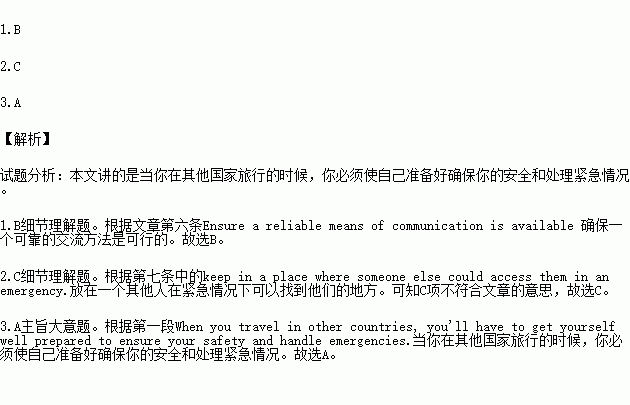题目内容
When you travel in other countries, you'll have to get yourself well prepared to ensure your safety and handle emergencies.
Before you leave, you'd better:
1. Take out medical insurance policy and learn what the plan covers and whether departure or return to the hometown is covered. Figure out payment choices, such as whether you have to speak directly with the insurance company, before or after treatment, whether you have to pay first and get compensation later.
2. Keep up to date on all required vaccinations (接种疫苗) .
3. Learn about the city or area where you are going to travel. Know how to say street names and landmarks in the local language. Figure out unique climate issues such as altitude, seasonal changes, potentially risky animals and insects.
4. Visit some local hospitals and write down addresses in the local language along with emergency entrance locations; do the same for dental/pediatric (小儿科的) services. Get first aid equipment with necessary medications. Take enough prescribed medication from the home country.
5. Carry a card or note written in both English and the local language listing your emergency contact numbers, name, basic medical information such as blood type and allergies (过敏) .
6. Ensure a reliable means of communication is available and carry an extra phone battery and a charger. Ensure that housemaids, drivers, office assistants, those who work or travel know how to call for medical assistance since they may be the only ones available in an emergency.
7. Make sure to bring all documents and visas along with you. Plan your journey carefully and carry copies of documents (ID, insurance policy records, medical records) and keep in a place where someone else could access them in an emergency.
1. In case you come across an emergency, you should _________.
A. carry a card or note which is written in the local language only
B. make sure your means of communication is available and reliable
C. buy enough prescribed medication from the foreign country
D. buy a guide book which includes basic emergency instructions
2.According to the passage, the following are true EXCEPT that ________.
A. you should try to make a good study of medical insurance policy
B. you'd make sure someone will be able to help you in emergencies
C. you'd hide your copies of documents for safety in a place that no one can find
D. you should try to get familiar with the city or area that you will visit
3. The best title for the text is _________.
A. How to Prepare for a Safe Travel
B. Emergency Help at Home and Abroad
C. How to Know the Place You Will Visit
D. Keep Yourself Healthy When Traveling
书面表达
高中生考入大学后,是否要立即为其配备笔记本电脑呢?对此,有人赞同,有人反对。请你根据下列表格的内容写一篇英语短文,并发表你的看法。
支持者 | 反对者 |
1. 是对子女奋发努力取得好成绩的肯定和奖励 2. 方便今后的学习,随时随地地可以上网查阅资料 | 1. 给有些家庭增加了经济负担 2. 大学学习条件比较优越,有足够的计算机房供学生使用 |
你的看法(至少两点)…… |
注意:1. 对所给要点逐一陈述并适当发挥,不要简单翻译。
2.词数100左右,开头已经给出,不计入总词数。
Is it necessary for freshmen to have a laptop when they go to university? Different people have different ideas.


